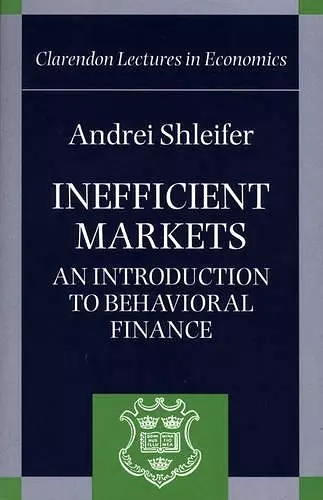Inefficient Markets
An Introduction to Behavioural Finance
Format:Hardback
Publisher:Oxford University Press
Currently unavailable, and unfortunately no date known when it will be back
This hardback is available in another edition too:
- Paperback£46.99(9780198292272)

This book presents a critical view of the Efficient Markets Hypothesis, advocating for behavioral finance as a more accurate representation of market dynamics.
In Inefficient Markets, the author challenges the long-standing Efficient Markets Hypothesis (EMH), which has dominated financial theory for nearly three decades. This hypothesis posits that securities prices reflect their fundamental values due to the rational behavior of investors and the role of arbitrage in correcting any price discrepancies. However, the author argues that this view is overly simplistic and fails to account for the complexities of real-world financial markets.
The book introduces behavioral finance as a compelling alternative perspective, emphasizing how psychological factors and institutional limitations lead to irrational investor behavior. It highlights evidence that contradicts the assumptions of investor rationality and perfect arbitrage, revealing how these elements contribute to market inefficiencies. By examining the behavior of less-than-rational investors and the constraints faced by arbitrageurs, the author provides a nuanced understanding of how markets operate.
Through empirical evaluation, Inefficient Markets presents models that better explain various financial anomalies, such as the outperformance of value stocks and the phenomenon of stock price bubbles. The author synthesizes existing research in behavioral finance, offering a robust theoretical framework that enhances the analysis of real-world market dynamics. This book serves as a significant contribution to the field of finance, encouraging readers to reconsider traditional views on market efficiency and to appreciate the complexities inherent in financial decision-making.
One of the very first books on behavioural finance ... covers some of the most important ideas in behavioural finance ... a rich source of empirical facts and new ideas, waiting to be further explored in financial economics ... Every financial economist, in particular those being trained in the classical finance school, should read this high-level book on behavioural finance. It is full of provocative and inspiring ideas that will keep your mind busy for many hours. I am sure this excellent book will become a classic in behavioural finance. * Journal of Institutional and Theoretical Economics26/03/2003 *
ISBN: 9780198292289
Dimensions: 224mm x 145mm x 17mm
Weight: 385g
224 pages